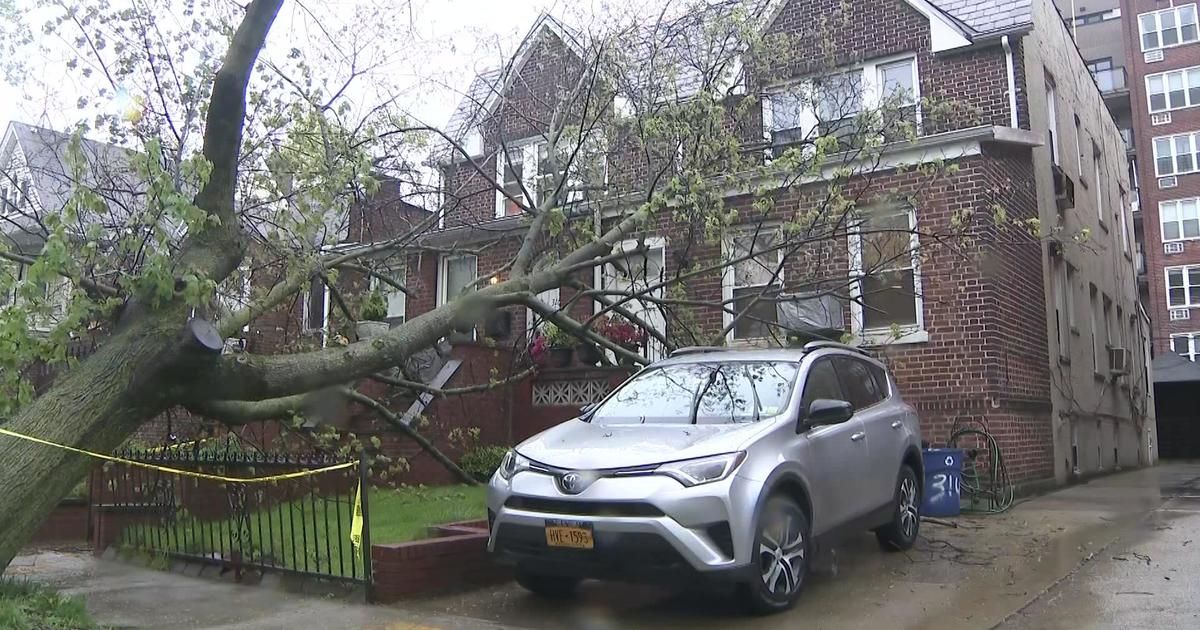US Stocks Open Lower, Pound Falls Further As UK Treasury Chief Tries To Calm Markets Amid 'Brexit' Fears
NEW YORK (CBSNewYork/AP) -- Stocks are opening lower on Wall Street following bigger losses in Europe as investors continue to grapple with the fallout of Britain's vote to leave the European Union.
The Dow Jones industrial average was down 178 points, or 1 percent, to 17,220. The Standard & Poor's 500 index lost 20 points, also 1 percent, to 2,017. The Nasdaq composite gave up 50 points, or 1.1 percent, to 4,657.
MORE: Full Coverage From CBS News MoneyWatch
The declines were far more modest than on Friday, when the Dow and S&P 500 had their biggest drops since August, as reported by CBS2's Dick Brennan.
"It's gonna be volatile and bumpy and I think right now I would tell people stay calm and carry on, you wanna make sure you are not doing anything rash in this environment, even if its gonna be kinda bumpy," CBS News financial contributor Melody Hobson said.
Meanwhile, U.K. Treasury chief George Osborne has sought to calm nerves in the markets.
In his first public appearance since the vote to leave the bloc Thursday, Osborne Monday tried to reassure markets shaken by the result, saying "our economy is about as strong as it could be to face this challenge.''
Yet, he acknowledged it would "not be plain sailing in the days ahead."
"But let me be clear, you should not underestimate our resolve," Osborne said. "We were prepared for the unexpected and we are equipped for whatever happens."
European stocks fell further in early trading Monday and the pound declined again as leaders struggled with the question of how precisely the country would separate Britain from the other 27 nations in the bloc.
Asian stocks were also mixed and futures point to a lower opening on Wall Street as the pound dropped to a new 31-year low, trading below $1.32 for the first time since 1985. By midday in London it was at $1.3216.
On Monday morning, Tokyo's Nikkei 225 rose 1.6 percent to 15,201.49 points, rebounding at least temporarily from Friday's 7.9 percent loss, its biggest since the 2008 financial crisis. The Shanghai Composite gained 0.6 percent to 2,870.92 and Sydney's S&P-ASX 200 added 0.5 percent to 5,136.80.
Hong Kong's Hang Seng shed 0.7 percent to 20,112.35 and Seoul's Kospi lost 0.1 percent to 1,923.13. Benchmarks in Singapore, the Philippines and Indonesia also fell.
The surprise outcome of Britain's referendum triggered a market plunge Friday that wiped out $2.1 trillion of stock value from Hong Kong to London to New York.
Traders were watching for more aftershocks as other EU leaders press London to start the complex process of leaving the 28-nation trading bloc. Prime Minister David Cameron wants to wait several months.
"Markets will be nervous given that the EU and U.K. have some mismatch in terms of timing of exit procedures and negotiations,'' said Mizuho Bank analysts in a report.
"The EU's legitimacy may be tested by separatist parties,'' it said. "Spanish elections more immediately and then French elections in 2017 add to the complexity of political dynamics involved in negotiations. Brewing uncertainty suggests that the stage is set for potentially stormy global markets.''
But what happens next depends on how policymakers handle the fallout in the coming days, Christine Lagarde, managing director of the International Monetary Fund, said at the Aspen Ideas Festival in Colorado on Sunday.
Economic risks, she said, depend on the level of uncertainty.
"How they come out in the next few days is going to really drive the direction in which risk will go,'' Lagarde said.
The financial markets did not panic Friday after the vote, Lagarde said. She said central bankers put a lot of liquidity into the markets so there wouldn't be a shortage, as happened during other market plunges, including in 2008.
"It was very much under control. We didn't see those sort of panic moves,'' she told the group.
The surprise outcome of the British vote brought more political turmoil Sunday. Leaders of the successful campaign to leave the EU stayed largely out of the public eye, offering few signals about their plans.
In Scotland, however, First Minister Nicola Sturgeon said she would consider advising the Scottish Parliament to try to use its power to prevent Britain from leaving the EU.
"As First Minister I'm going to do everything I possibly can to prevent Scotland being taken out of the European Union, because the consequences of allowing us to be so will be devastating," Sturgeon told the BBC.
She said Scottish lawmakers might be able to derail the move by withholding "legislative consent'' for a British exit, or Brexit.
U.S. Secretary of State John Kerry has planned a visit to London Monday afternoon on his way home from Rome, CBS News reported.
"We will continue, the United States, to have a very close and special relationship with Great Britain," Kerry said. "We value that relationship. That does not change because of this vote."
(TM and © Copyright 2016 CBS Radio Inc. and its relevant subsidiaries. CBS RADIO and EYE Logo TM and Copyright 2016 CBS Broadcasting Inc. Used under license. All Rights Reserved. This material may not be published, broadcast, rewritten, or redistributed. The Associated Press contributed to this report.)



